Th e Holy Prophet Muhammad, peace and blessings of Allah be upon him, said:
He who observed the fast in the month of Ramadan and then followed it with six (fasts) of Shawwal it would be as if he fasted perpetually.
(Sahih al-Muslim, Kitab al-Siyam)
Th e Holy Prophet Muhammad, peace and blessings of Allah be upon him, said:
He who observed the fast in the month of Ramadan and then followed it with six (fasts) of Shawwal it would be as if he fasted perpetually.
(Sahih al-Muslim, Kitab al-Siyam)
Marwan Gill
Argentina Correspondent
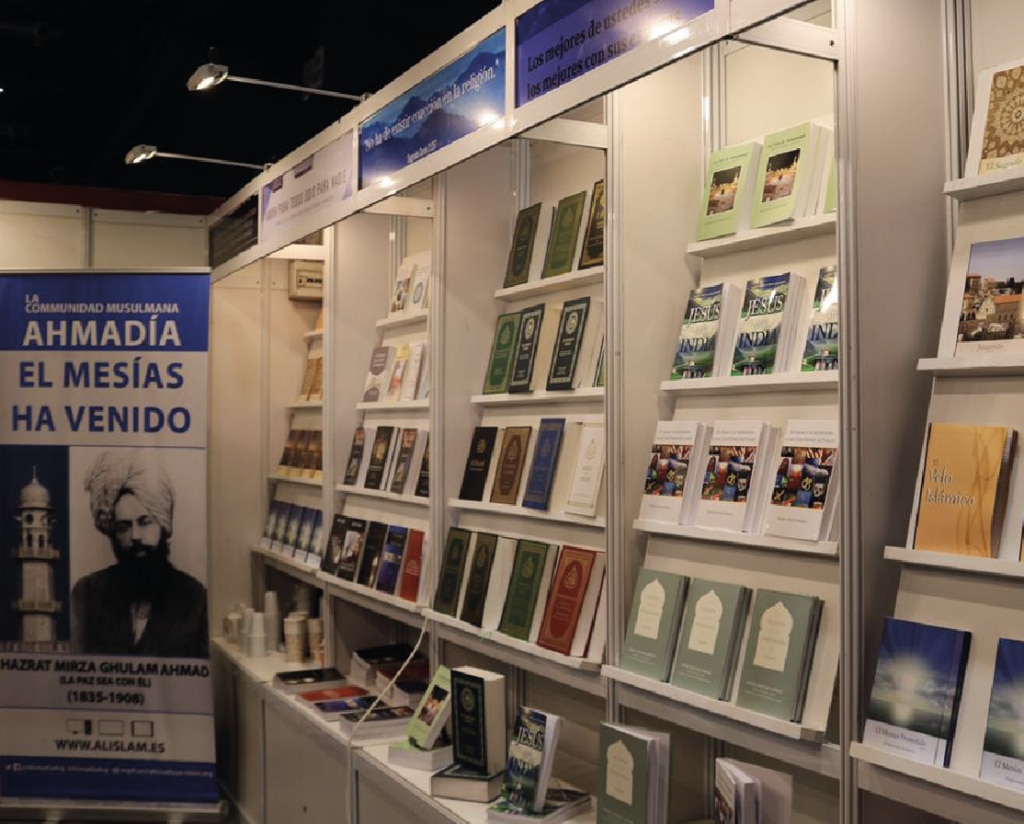
The Ahmadiyya Muslim Community in Argentina, for the second time, had the opportunity to participate with a stand in the International Book Fair, which was held from 25 April to 13 May in Buenos Aires, Argentina.
The International Book Fair of Buenos Aires is the most important cultural event in Argentina and is considered as one of the most significant book fairs in the world with more than one million visitors each year.
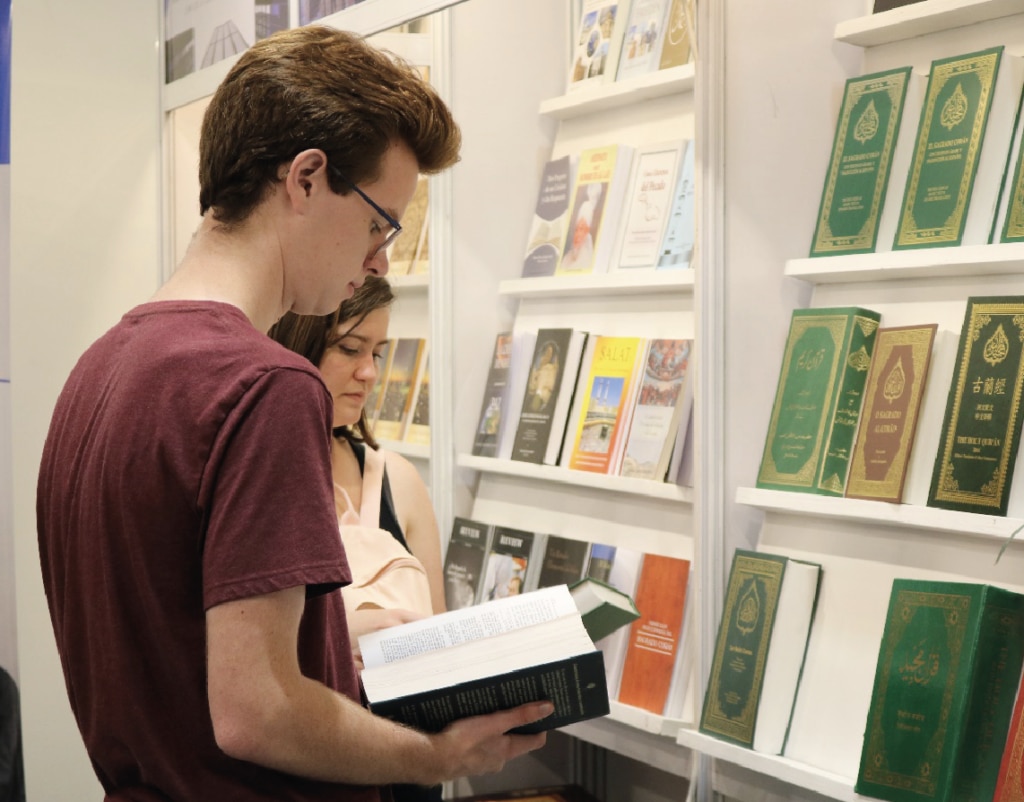
By the grace of Allah, we had the opportunity to present at our stand the translation of the Holy Quran in various languages and different Islamic literature in Spanish language.
During the book fair, thousands of people were introduced to the true Islamic teachings and the advent of the Promised Messiahas.
More than 100 people left their personal details to continue staying in contact with the community and to find out more about Islam. Furthermore, during the book fair, two conferences were held. The first conference was held on 5 May under the heading “I am a Muslim – do you have any questions?”. More than 80 people participated with great interest in this conference and were given the opportunity to get the answers to their questions and doubts with regard to Islam.
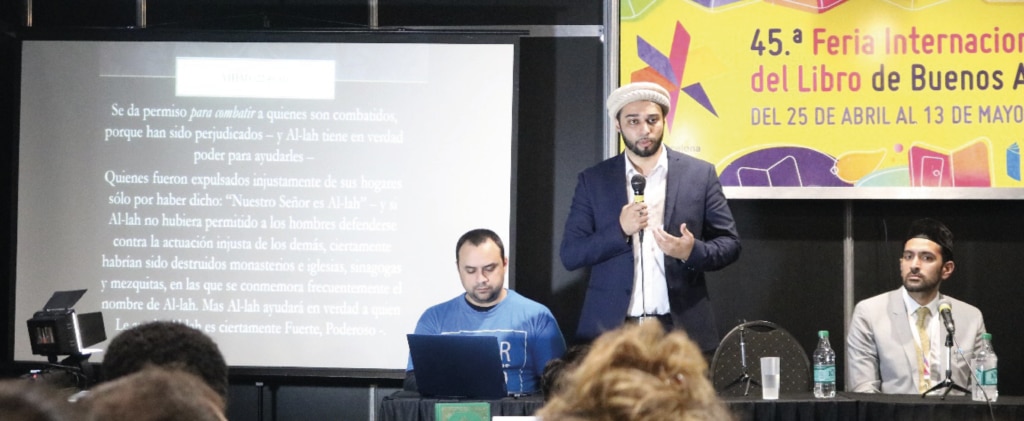
The second conference “Jesusas in Islam” was held on 12 May, in which 65 people participated. Aside from our local members and friends of the Community here in Argentina, three Ahmadi brothers from Uruguay and one Ahmadi brother from Germany came to help us during the book fair. May Allah reward the efforts of all the volunteers.
Mufeezur Rahman
Bosnia Correspondent
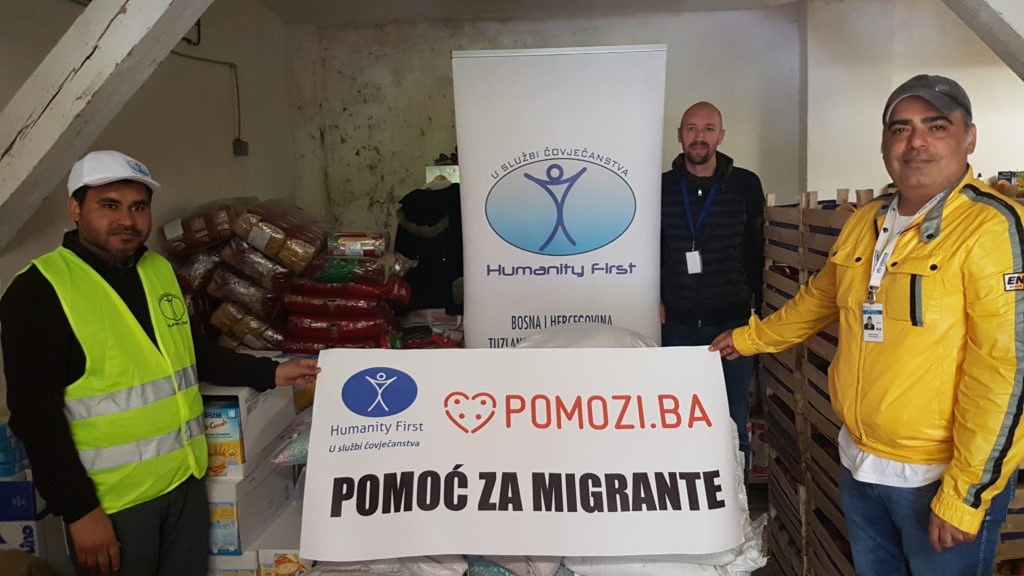
Humanity First Germany, in cooperation with Humanity First Bosnia, organised a food security project, this time in the refugee camp of Sarajevo.
Regional Director of Humanity First for the Balkan Peninsula, Zubair Khalil Khan Sahib and local volunteers of Humanity First Bosnia amicably organised all the matters related to camp management.
Currently, this refugee camp is managed by UNICEF and IOM. Local humanitarian organisation Pomozi.ba undertakes all the routine matters pertaining to refugees. At present, 800 refuges belonging to different nationalities are housed in the camp.
At the request of Humanity First Bosnia, Humanity First Germany sponsored the project with 350,000 euros. Food items were delivered to the camp management. According to the management, this donation will facilitate about 3,000 meals for the refugees.
On arrival, the camp manager welcomed the Humanity First officials. Then a tour and briefing of the camp activities were done by IOM and Pomozi officials.
Alhamdolillah, this kind gesture of Humanity First was appreciated by all concerned and it was hoped that such cooperation would continue in future also.
Luqman Bajwa
Guadeloupe Correspondent

Jamaat-e-Ahmadiyya Guadeloupe held a Quran exhibition from 17 to 19 May 2019 in Pointe a Pitre.
Guadeloupe is a small Caribbean island in Central America and a province of France. The Jamaat was established in Guadeloupe in 2016 and Luqman Ahmad Bajwa Sahib is the first missionary in Guadeloupe. Jamaat Guadeloupe consists of 5 members.
In preparation for the exhibition, Patrice Mayeko, a local Ahmadi, and Luqman Ahmad Bajwa Sahib, missionary in-charge, handed out 500 invitations to the people of Guadeloupe.
Guadeloupe’s national news outlet published a report with a picture of our previous exhibition of 2017.
In the exhibition, we had the Holy Quran in over 30 different languages on display for the locals to visit and ask questions on various matters relating to Islam.

The exhibition was visited by over 55 people, which, for a small island such as Guadeloupe, is quite a significant amount. This event was visited by a priest from the protestant church. Many people who visited the exhibition, at first, came with a different image of Islam. However, after the exhibition, many of their misunderstandings about Islam were cleared.
This event was visited by a priest from the protestant church. Many people who visited the exhibition, at first, came with a different image of Islam. However, after the exhibition, many of their misunderstandings about Islam were cleared.
During the exhibition guests were given the opportunity of leaving feedback behind.
A protestant priest wrote: “Thank you for this exhibition, which allows us to find the truth.”
A non-ahmadi Muslim woman wrote: “Excellent initiative to allow Guadeloupian people to discover the true Islam”
A theologian researcher wrote: “It was a great pleasure to have this rich and pacific exchange. Hope to exchange views soon again.”
Madame Corinne wrote: “A very good initiative to clarify and make known a religion; very good explanations by the imam.”
Laiq Ahmed Atif
Malta Correspondent
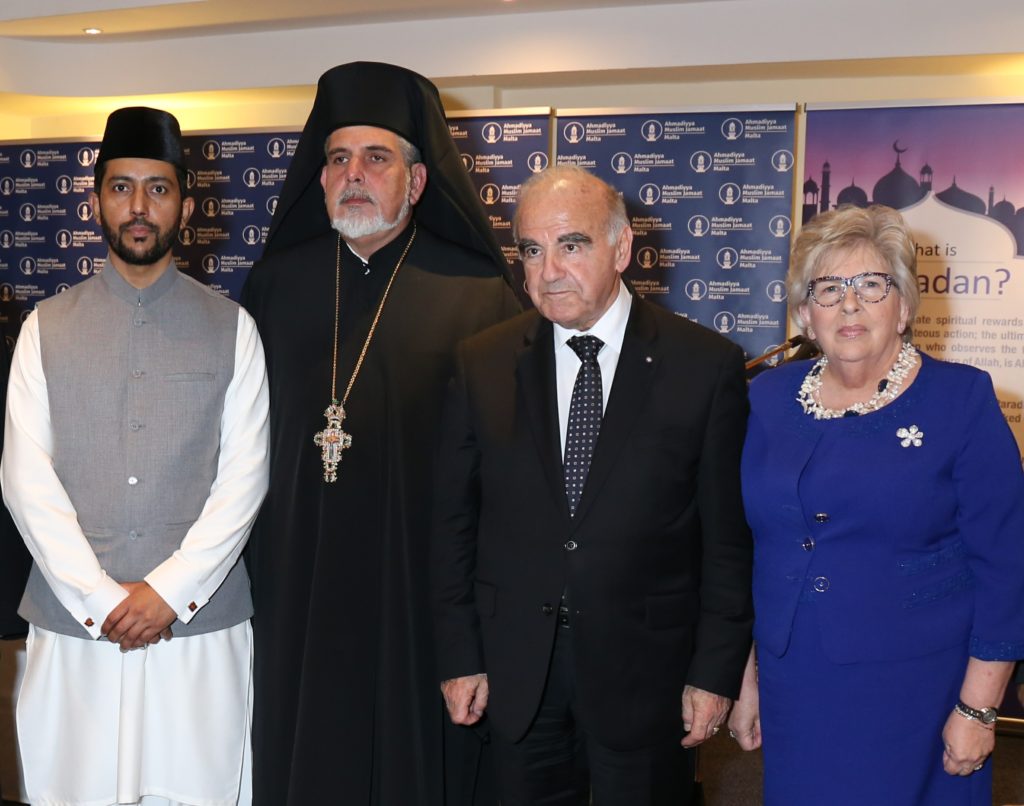
On Friday 31 May, the Ahmadiyya Muslim Community in Malta hosted an Interfaith Ramadan Iftar Dinner and its 11th Annual Peace Symposium collectively on the theme Ramadan & Peace: The Concept of Fasting in Religions and invited distinguished guests and faith and community leaders to join in the celebration. The President of the republic of Malta, His Excellency Dr George Vella and his wife were the special guests.
The event brought together guests from different walks of life to join the important discussion about the purpose of fasting in religions, to celebrate the holy fasting month of Ramadan in Islam and break the fast with the community. All major faiths were represented at the event.
The aim of the interfaith gathering is to promote a deeper understanding of Islam and other faiths and to inspire a concerted effort towards lasting societal peace.
The programme began with the recitation of the Holy Quran. In his opening address, His Excellency Dr George Vella spoke about the need of interfaith harmony, dialogue and understanding, and he congratulated the Ahmadiyya Muslim Jamaat for such a unique event that brought together people from diverse backgrounds, including religious leaders, and said:
“It is with great pleasure that I am meeting with members of the Muslim community to celebrate the breaking of the fast together. I wish to congratulate Imam Laiq Ahmed Atif and the Ahmadiyya Muslim Jamaat for taking such an openminded approach to celebrate the traditional Islamic Ramadan, and promoting unity by inviting us all here today to share with you the breaking of the fast, irrespective of our religious beliefs.”
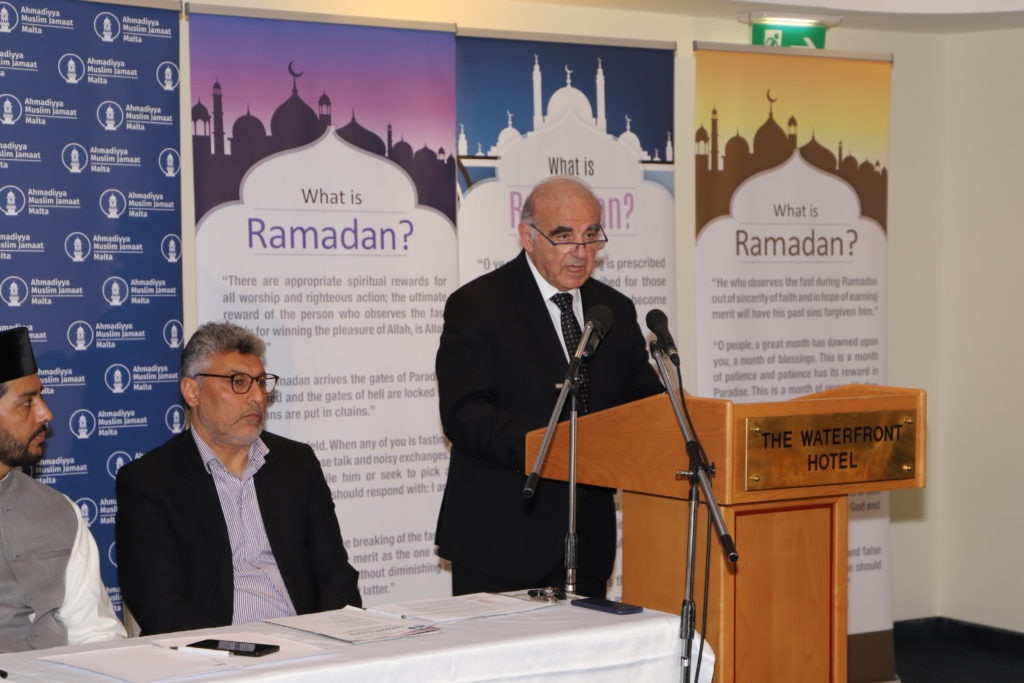
He further said: “Ramadan is a period where one exerts self discipline. It is a time to impose self-control on oneself. It is an occasion to redirect the heart towards understanding others and sympathise with the needs of others. It is a time to be generous with those less fortunate than us. It is a time when one explores to find true satisfaction, a deep personal examination on our strengths and our weaknesses. It is a form in which one can experience spiritual awakening, and hopefully strengthen one’s conscience to do better in life.”
Highlighting the importance of peaceful coexistence, he said: “I call on everybody to cherish, celebrate and to promote the peaceful and amicable relationships between the different communities found on these beautiful Islands we call our home.”
His Excellency concluded by saying, “Allow me once more to appeal to all of us to reaffirm our strong belief and nourishment of dialogue, mutual understanding and inclusion. Let us reaffirm Salam (peace) as our ultimate and final objective. Assalamo Alaikum.”
In this event, Rev Dr Joseph Ellul, Chairman of the Commission for Interreligious Dialogue of the Archdiocese of Malta, talked about a Christian perspective on fasting while Mr Gordhan Mohnani spoke about the concept of fasting in Hinduism. Rev Ioan Iftimia of the Rumanian Orthodox Church, Rev Sodo of Zen-Buddhism and Archimandrite Nathanael Felesakis of the Greek Orthodox also contributed briefly.
Imam Laiq Ahmed Atif, President Ahmadiyya Muslim Jamaat Malta delivered the closing address, discussing the spiritual objectives and the philosophy of fasting in Islam. The session concluded with a recitation of prayers from the Holy Quran and sayings of the Holy Prophetsa.
After the breaking of fast and Maghrib prayer, a buffet dinner was served.
The feedback from the event was overwhelmingly positive and it was successful in portraying the true image of Islam and promoting dialogue and understanding. Maghrib prayer, which was offered in congregation, was a unique experience for the non-Muslim guests, and for many it was their first experience in their lives to witness how Muslims prayed.
One Christian guest said: “It was a unique experience in my life. The melodious recitation touched my heart. I prayed with you and I prayed for you.”
One guest commented: “It was a great evening with a lovely group of people believing in similar visions; strangers becoming friends. May God bless your fantastic work!”

One religious leader said that he was very much moved by this wonderful experience. He said this practical example was the real essence which the Ahmadiyya Muslim Community had shown with love, care, warmth and friendship; it was truly amazing. “Many a time we don’t find words translated into actions, because, it is easier said than done, but you proved so with your practical example. I really admire your hospitality and willingness to embrace all people.”
One diplomat commented: “Thank you for your kind invitation to a heart opening event, and a great opportunity to realise that people who truly love God will always speak one language. Ramadan Mubarak.”
Talking about the organisation, one guest wrote: “Excellent organisation and very insightful panel of keynote speeches. This was a truly inspiring moment of interfaith exchange, allowing for fruitful dialogue and increasing understanding. I felt that I personally have learnt a lot. Congratulations on your outstanding work.”
Abass Bin Wilson, Ghana Correspondent
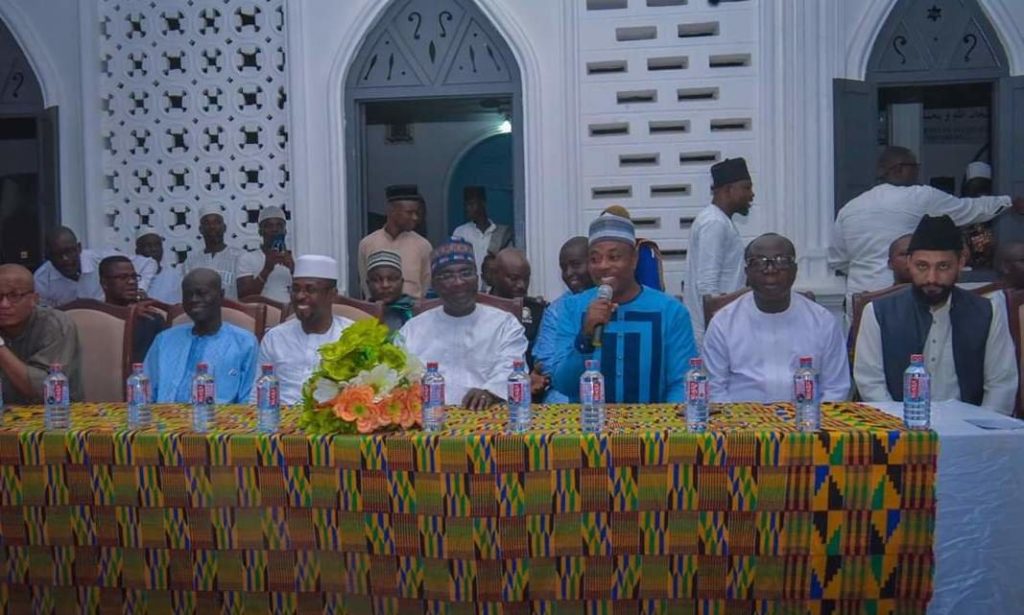
On Friday, 17 May 2019, His Excellency Alhaj Dr Mahamudu Bawumia, Vice President of the Republic of Ghana visited the Mangoase Zonal Headquarters of the Ahmadiyya Muslim Mission, Ghana.
Dr Bawumia had iftari with members of the community in Mangoase Jamaat and also prayed Maghrib and Isha with them. He was accompanied by ministers of state as well as leading members of the ruling party.
The vice president and his team were received at the forecourt of the mosque where hundreds of Ahmadi Muslims from Gomoa Mangoase Township and its immediate surroundings had gathered and had iftari with him.
He was welcomed on behalf of the Jamaat by Alhaj Abass Bin Wilson, General Secretary of the Ahmadiyya Muslim Mission Ghana, who expressed gratitude to the vice president for visiting a local branch of the community.
Addressing the gathering after the Maghrib and Isha Salat, the vice president said that his visit was to take advantage of the blessed month of Ramadan to fraternise with Muslim brethren across the country and solicit for their prayers.
“Being a Muslim”, he said, “I am aware that the month of Ramadan is the holiest and most blessed month of the year, which is why I found it necessary to visit fellow Muslims and request for their prayers for Allah’s blessings and guidance.”
He entreated all and sundry to pray for the government and the people of Ghana, as well as for the peace and progress of the country.
Tahir Ahmad Machengo
Kenya Correspondent
On Sunday 26 May 2019, the local Nairobi Jamaat successfully held its Khilafat Day Jalsa. The event was held at the local Jamaat mosque which serves as the national headquarters, located along Murang’a Road.
The event started immediately after Asr Salat, with the recitation of the Holy Quran followed by its English translation by Mualim Nasir Hadji Sahib. After that was an Urdu Nazm by Tahir Ahmad Sahib and Shabbir Chanzu Sahib.
Thereafter was a short speech by a Tifl, Aahil Sheikh explaining what the institution of Khilafat is and who the Khalifa is. The second speech was on the essence of Khilafat Day by Athar Bhatti Sahib. In his speech, he stated that the real essence of Khilafat is obedience to the institution of Khilafat.
The third speech, in Swahili language, was about Hazrat Abu Bakr’sra life as the first Khalifa of Holy Prophetsa which was delivered by Ismail Bakari Sahib. In his speech, he narrated the pious life history of Hazrat Abu Bakrra.
The last speech, delivered by Ismail Juma Sahib was about the institution of Khilafat in the Holy Quran, with extracts from the sayings and writings of the Holy Prophetsa, the Promised Messiahas and Khulafa regarding institution of Khilafat and its significance. Thereafter, the amir and missionary in-charge of Kenya delivered the concluding remarks. In his remarks, Amir Sahib gave a gist of Huzoor’saa Friday Sermon of 24 May 2019. The event ended with silent prayer led by Amir sahib. A total of 95 participants attended the Jalsa.
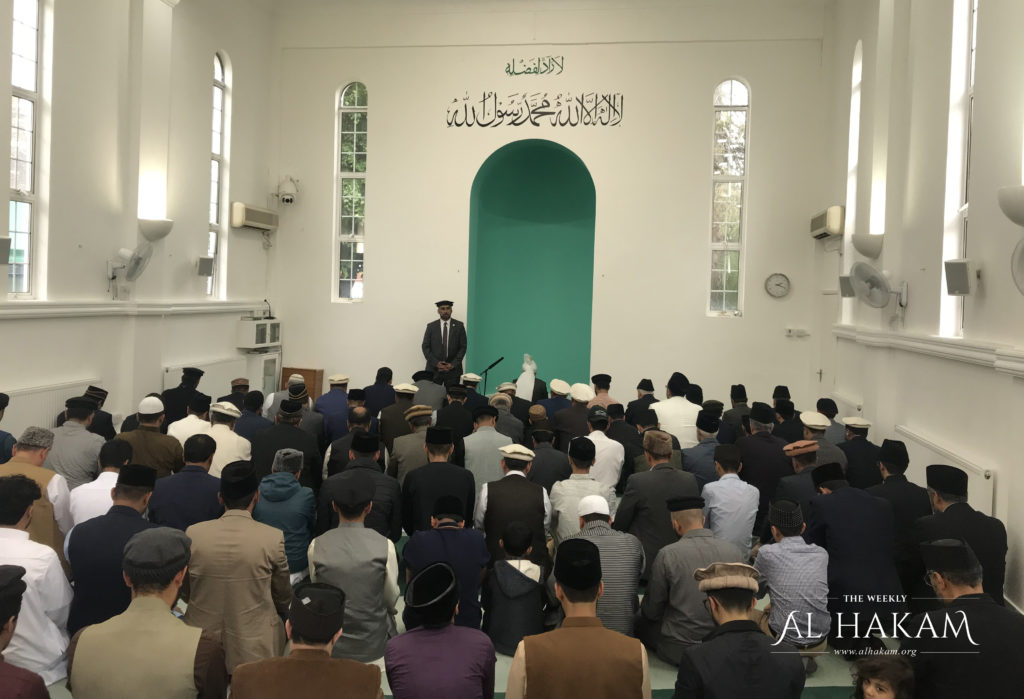
5 June 2019, London: After delivering the Eid Sermon at Baitul Futuh Mosque, Hazrat Amirul Momineen, Khalifatul Masih Vaa headed to the Fazl Mosque.
Being his first visit to the Fazl Mosque after the shift to Islamabad, it was another joyous moment on the festive occasion of Eid-ul-Fitr 2019.
Huzooraa attended a lunch that he was hosting for his greater family.
Hazrat Amirul Momineenaa led the Zuhr and Asr prayers in the Fazl Mosque, bringing back many pleasant memories of over 16 years when he would lead prayers in this mosque.
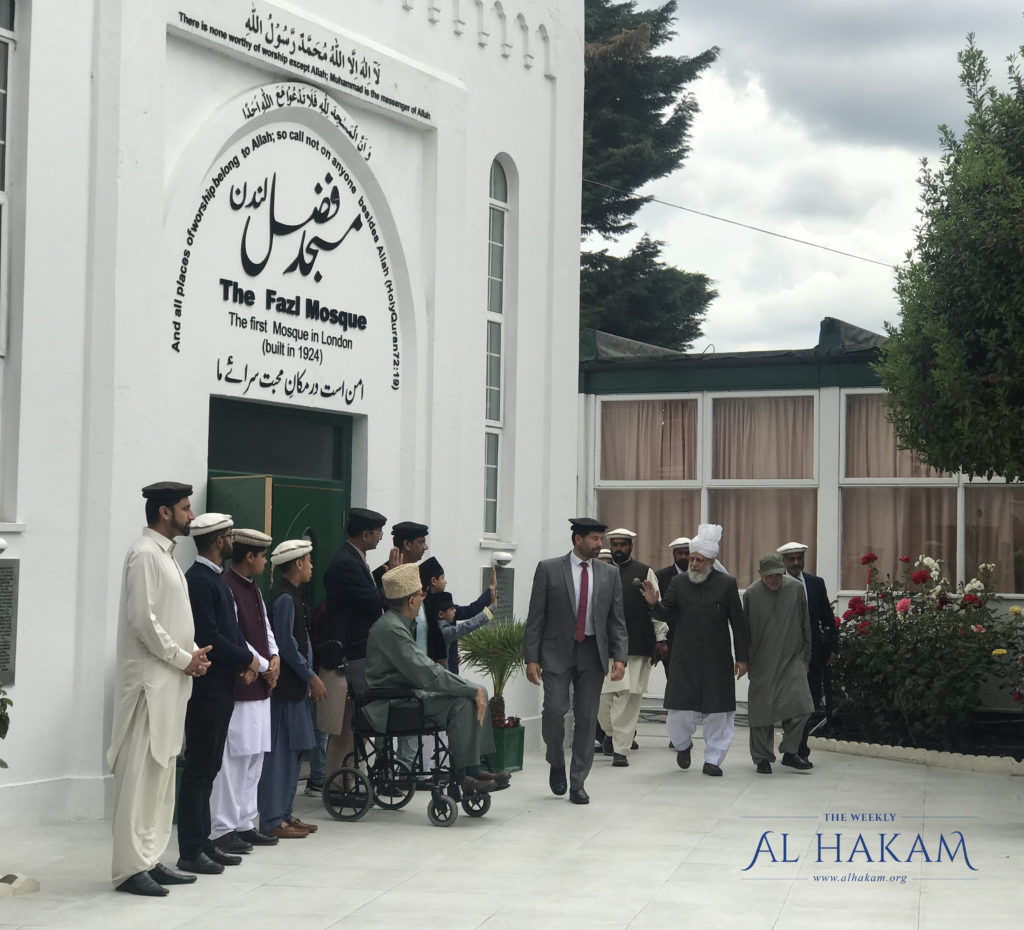
Local residents of the area – once the Muqami region for being home of the Jamaat’s markaz – were overwhelmed and moved to have Huzooraa in their midst.
Bearing in mind what Huzooraa said in his dars yesterday regarding Ahmadis in Rabwah who have been waiting for the last 35 years for the moment when circumstances become favourable enough to welcome Khalifatul Masih once again, we should all – wherever we live in the world – be thankful that we as Ahmadis have Khalifatul Masih. Wherever he lives, he thinks of us. He cares for us, he remembers us, he prays for us. What else can we ask for! Allah bless our Imamaa with eternal peace, comfort and security.
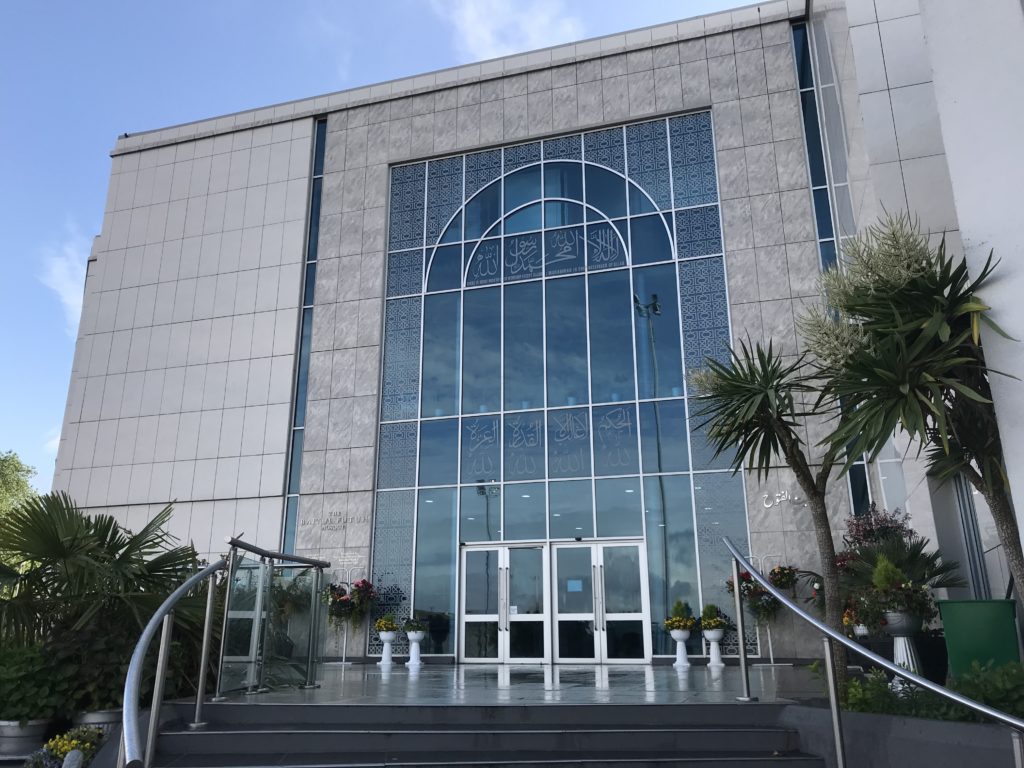
After his arrival at Baitul Futuh Mosque, Morden a little after 10:00 GMT on Wednesday, 5 June, Hazrat Amirul Momineen, Khalifatul Masih Vaa led the Eid-ul-Fitr prayer after which Huzooraa delivered the Eid Sermon.
Huzooraa said that over a hundred years ago, Hazrat Musleh-e-Maudra delivered a sermon, the subject of which applies even today. Huzooraa said that he would use the subjects mentioned in that sermon in his Eid Sermon.
Talking about Eid and true happiness, Hazrat Musleh-e-Maudra said that true happiness connotes the gathering together of people, for instance in the form of marriage, birth of a new born child or other such get-togethers. Festivals are also joyous occasions as people gather together. Thus, Huzooraa explained, man is a social being who lives with other people and does not cast himself away from society.
However, there are those who suffer from depression or who prefer to cut off from society. Even to such people, doctors advise that they should socialise and surround themselves with people as much as possible.
Thus, for the expression of sadness, one prefers to be alone, whereas for expressing delight and joy, one prefers to be among people.
As Islam is the natural religion, it desires for us to gather together on Eid and partake of the joys and happinesses at this occasion. The foundations of this gathering were laid when a dear servant of Allah proclaimed:
یَا اَیُّہَا الْاِنْسَانُ اِنِّیْ رَسُوْلُ اللّٰہ اِلَیْکُمْ جَمِیْعًا
“O man, surely I am a messenger of Allah for you all.”
There were eids during the time of various prophets such as Mosesas, Davidas, Jesusas and others. Those eids were limited to their specific locations. However, the larger Eid was when Allah commissioned His dear Prophetsa to gather mankind at one hand.
All prophets were sent for their specific locations at their specific times; Jesusas at one stage said that he would not cast bread to dogs that came from outside.
The Holy Prophet Muhammadsa was told:
ْوَ اَمَّا بِنِعْمَتِ رَبِّکَ فَحَدِّث
“As for the favour of your Lord, remember it often.” The unique aspect of the Holy Prophet’ssa prophethood is that not only did he not refuse giving to others, rather his custom was to spread blessings in each household. His appearance in this world was the greatest eid. Through the Prophetsa, religion was completed and divine teaching was perfected.
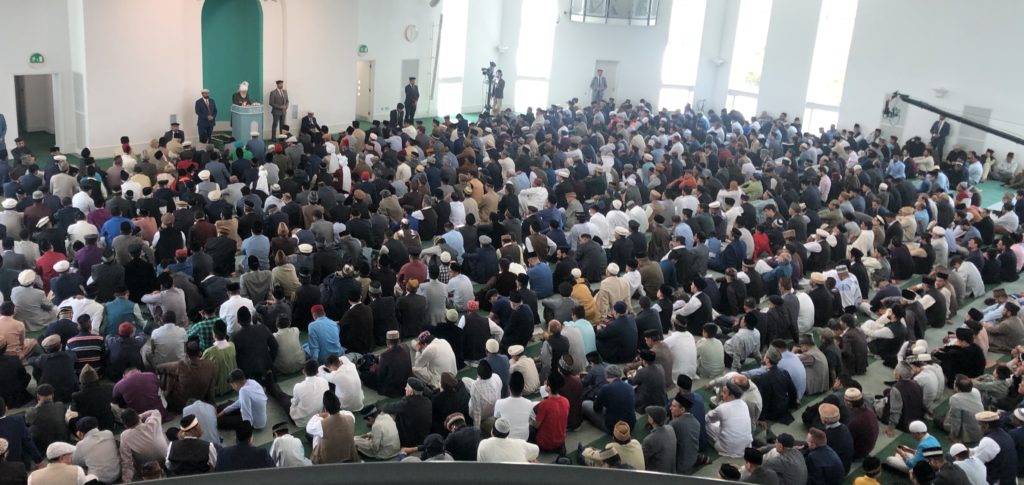
In one place, explaining this, the Promised Messiahas explained that the Prophetsa was sent to this world to create one community of the many communities that dwell on this earth, thus reflecting the unity of God and the uniqueness of the prophethood of the Holy Prophet Muhammadsa in that he was the sole prophet sent for the whole world.
It is to this aspect that the following verse of the Holy Quran points out:
ِہُوَ الَّذِیْ اَرْسَلَ رَسُوْلَہُ بِالْہُدَی وَ دِیْنِ الْحَقِّ لِیُظْہِرَہُ عَلَی الدِّیْنِ کُلِّہ
“He it is Who has sent His prophet with guidance and the religion of truth so that He may make it prevail over all others.”
In keeping with this theme, we will truly witness Eid when the entire world gathers at one hand through the Holy Prophet Muhammadsa. Thus, where the responsibility of experiencing the true eid in this day and age has been assigned to us, we should assess ourselves and realise our duties.
The Promised Messiahas, at one place, explained that we should, in all circumstances, remain loyal to Allah and remain occupied in serving His religion. His Jamaat should be watchful over taking care of the rights of their fellow beings and through our loyalty, we should attempt to please Allah, by means of obligatory and voluntary prayers and deeds.
There is a dire need for us to pay attention to our responsibilities as servants of the Holy Prophetsa and his servant, Promised Messiahas.
Jesusas at one place prayed for a prophet who would gather the whole of mankind at one place and thus bring unity in humanity.
Huzooraa said that a lot of focus is spent on new clothes and celebrations on this joyous occasion. The delight behind this is because Allah has instructed us to do so. However, when we look at this celebration, we are not gaining any material benefit, although we may be obtaining spiritual benefit, provided we celebrate Eid in the true manner. Thus, at this occasion, we should bear in mind that we are celebrating a far more exalted cause; we are celebrating the purpose of the advent of Prophet Muhammadsa and his servant, Hazrat Mirza Ghulam Ahmadas.
Today, the world is petrified of the slogan Allahu Akbar due to extremists and radicals. However, we should disclose the reality of such words so that the entire world feels delight in repeating and uttering the words:
ُاَشْہَدُ اَنْ لَّا اِلٰہَ اِلَّااللّٰہُ وَ اَشْہَدُ اَنَّ مُحَمَّدًا عَبْدُہُ وَ رَسُوْلُہ
“I bear witness that there is none worthy of worship except Allah; And I bear witness that Muhammad is His servant and messenger.” Instead of the world cursing the Holy Prophetsa, they should be taught in a manner so they feel comfort in invoking blessings on the Holy Prophetsa.
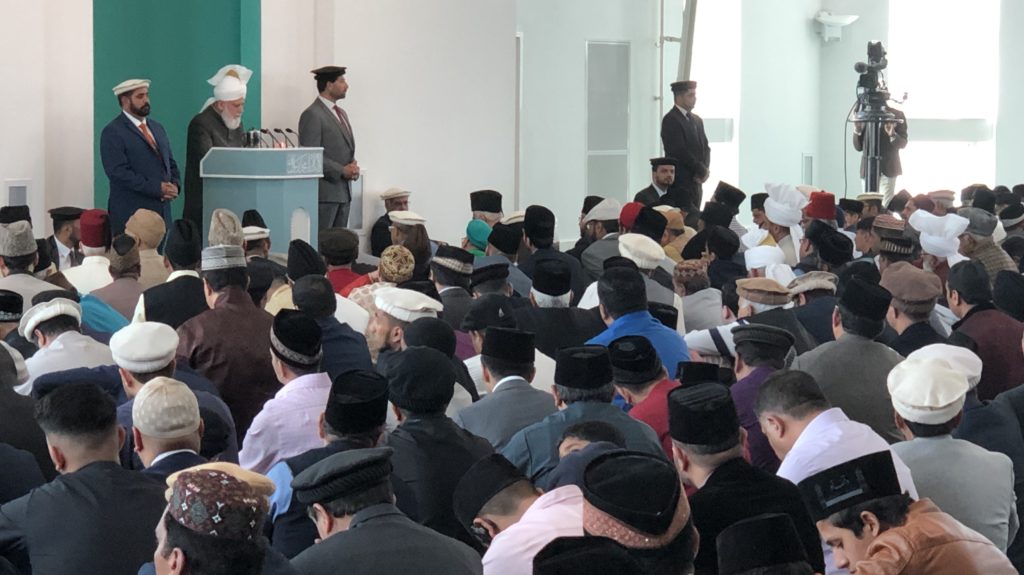
Huzooraa prayed that may Allah bring that day closer when the world invokes blessings on the Holy Prophetsa.
There is a drastic change in the world’s attitude towards Islam and religion. Huzooraa said that he receives many letters from Africa saying that such and such person was a polytheist, but they eventually accepted Ahmadiyyat in Islam.
Huzooraa prayed that may Allah enable us all to follow the guidance given by the Promised Messiahas in The Will (Al Wasiyyat) in which he said that we should, to the best of our abilities, represent him and his Jamaat before the world in order to draw them closer to the truth.
Towards the end of the prayer, Huzooraa congratulated the entire Jamaat present and watching on MTA all around the world.
Huzooraa then asked the Jamaat to pray for asiran-e-rah-e-Maula (prisoners in the way of Allah who are going through difficult circumstances), Shuhada (martyrs) and their families and children, missionaries (that they may be able to serve the cause of Islam Ahmadiyyat with great passion and dedication), all Ahmadis in general (that Allah may keep everyone in His protection from all evils) and Muslims in general (that Allah may enable them to hearken to the Messiah of the age).
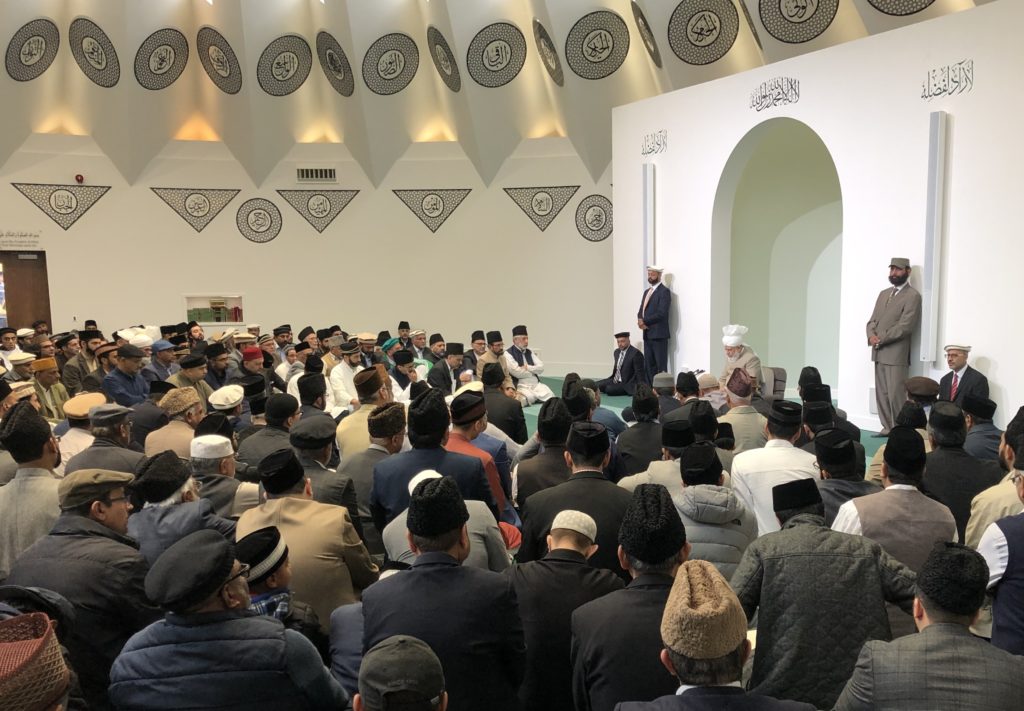
On Tuesday, 4 June, at 12:32pm, Hazrat Amirul Momineen, Khalifatul Masih Vaa arrived at the Mubarak Mosque, Islamabad to deliver the final dars of the Holy Quran for Ramadan 2019.
Huzooraa began the dars with the recitation of the final three chapters – Surah al-Ikhlas, Surah al-Falaq and Surah al-Nas – followed by their Urdu translation.
Huzooraa then began the commentary of the three verses by quoting an extract from the writings of the Promised Messiahas in which Huzooras explained that God Almighty is Independent in all His attributes, everyone seeks blessings from Him and He is the sole Being Who blesses.
In another extract, the Promised Messiahas mentioned that Allah is the Being Who is free from all flaws and Who possesses the perfect attributes.
Huzooraa said:
“Allah is the name of that Being who is the carrier of all attributes. Allah is the personal name of God and it is only Islam that has given this name; no other religion or Shariah uses this name. This is the God Who is free from any associates or partners. Using the word Ahad, believers have been told to proclaim the unity of Allah.”
Huzooraa then explained,
“Athesists think that God is not a Being and the world came into existence itself and that no deity has any control over the universe. On the other hand, they do believe that due to their own control, they can bring about change through their own efforts. God tells us to explain to such people that they are false. God exists and He is free from all blemishes and is the carrier of all attributes.”
Huzooraa then went on to talk about the mercy of God and how He has provided means for our physical sustenance without us asking. He has provided us water, but at the same time, he has also provided spiritual water of which irreligious people do not take advantage.
Huzooraa then quoted multiple verses of the Holy Quran that show how Allah has complete control over the universe, how He has provided ease for us in our day to day lives and provided sustenance for us in the earth.
Huzooraa explained that it was the mercy of God that He has not sent down the full weight of natural calamities on the people who are causing disorder in the earth. People commonly ask why such people are not captured by God and reprimanded, however God Almighty states at different places that He gives such people respite.
Even the biggest superpowers on the earth cannot stop natural disasters. If they come to God Almighty, only then can they seek protection from these calamities and it is only God Who can halt them. Huzooraa recalled an incident that occurred a few years ago, saying:
“While on a tour in Fiji, one day early in the morning before Fajr, I received phone calls from Nazir-e-Ala in Pakistan and the news had it on BBC that a severe Tsunami was headed for Fiji that would cause devastation. There was great panic. Various loved ones began calling too. The time for prayer came and we left our residence for the mosque. Before prayer, I announced to all worshippers that in our prostrations we would pray for Allah to divert this Tsunami elsewhere. I would pray and I told them that they should follow me in this. We prayed and Allah bestowed calm there and then. When we returned, we realised that the Tsunami had diverted. This is God’s power. Superpowers cannot halt these calamities, however He listens to the prayers of His servants, His believers, His worshippers.”
Huzooraa explained that in this time of polytheism and atheism, we must inform the world about the unique attributes of God.
In an age when the Holy Prophet Muhammadsa and Islam are targets of opposition and contempt, Huzooraa said that it is incumbent upon us to follow the path that Allah has drawn out for us.
There are constant efforts to cripple and weaken the state of Islam and the reaction of certain Muslim groups are strengthening such intentions. Huzooraa explained that it was for such reasons that Allah had taught the prayer:
“And from the evil of the night when it overspreads; And from the evil of those who blow into knots [to undo them].” (Surah al-Falaq, Ch.113: V.4-5)
Similarly, many efforts have been made to establish a khilafat, and when a considerable amount of money was spent in this cause, people have written that groups such as Daesh was functioning as a result of the world’s superpowers and their funding. According to analysts, such a long war with seemingly unending resources would not have lasted as long as it did. Nonetheless, Huzooraa said, the purpose of this was to cripple the state of Islam.
“Once, during a tour in Ireland, I was asked by a journalist that terrorists and rebellious groups would not succeed due to standing up to governments. However, now that Khilafat has been established and Muslims had united by this, I was asked, would it not be different? I explained that this group was a terrorist and extremist organisation similar to how groups had risen in the past and as previous groups desired to only spread unrest, this group would also not be successful and would end miserably as Khilafat can only be bestowed by God. Thus, we see that the 3-4-year hue and cry has now died down and very few remnants of this leadership are left today.”
Huzooraa said that such efforts cannot be successful. Such efforts to cripple the state of the believers have been made in the past, but just as those were never successful, similarly, these efforts would go in vain. We must, as believers, establish a living connection with our Lord and follow every command of Allah.
While we should be thankful to our parents, loved ones, benefactors and governments that have provided us ease, we should never forget that this is done under the command of Allah, and we must naturally be grateful to Allah who is “the Lord of mankind, the King of mankind” and “the God of mankind” (Surah al-Nas, Ch.114: V.2-4)
In circumstances when nations have decided to severely oppose Ahmadis, we Ahmadi Muslims must realise that it is only Allah the Almighty Who can protect us from the evil intentions of such groups. We should only seek His protection as only He can make positive changes. May Allah grant all Ahmadis the strength to do this.
Before dua, Huzoor said that we should pray for the following:
We should pray for the Holy Prophet Muhammadsa and his progeny.
We should pray that Muslims realise the real purpose of the advent of the Promised Messiahas and that all Ahmadis are protected from all harms. May the Muslims become united once again. Huzooraa said that it was as a result of this division that external groups take advantage and are able to further divide Muslims.
We should pray for the worldwide Ahmadiyya Jamaat that Allah may keep every single member in His protection and that everyone may be attached with Khilafat. Similarly, may Allah make it so that all office-bearers are such that they realise their responsibilities and other Ahmadis are such who respect office-bearers within the Jamaat. May all office-bearers fulfil the rights of all Ahmadis.
We should pray that we are protected from the evils of today and the direction the world is headed, i.e. worldwide catastrophe. May Allah protect everyone from warfare.
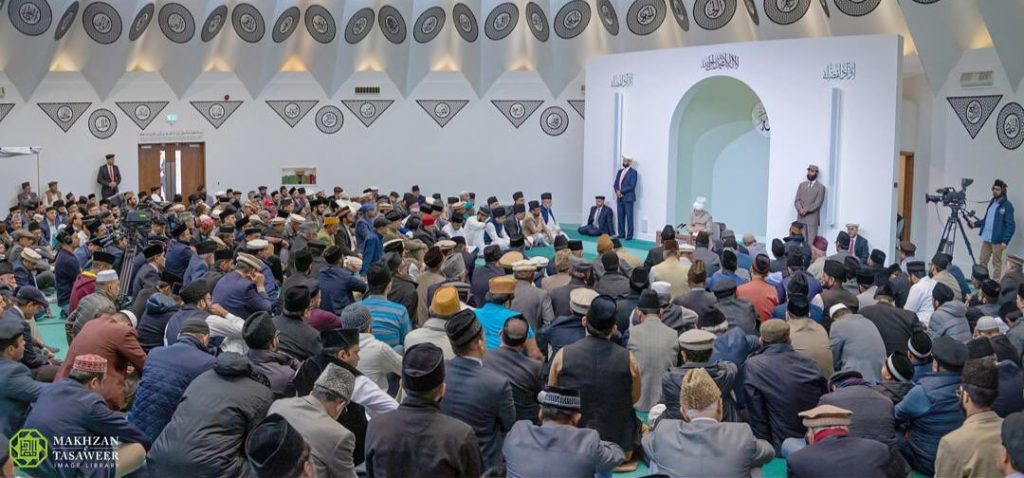
We should pray that we fulfil the responsibility of spreading Islam to the corners of the earth.
We should pray for shuhada-e-Ahmadiyyat and their families. May Allah protect their families Himself and keep them from every worry. May Allah keep asiran (prisoners in the way of Allah) in His protection and grant their families happiness once again.
We should pray that all those who are ill are granted health; those who are in debts are quickly given the means to pay off their debts; all groups who are targeted in any form of opposition that Allah may help them.
We should pray that family feuds end. We should pray for orphans, for those young women who have reached the age of marriage but are not yet married; widows; those students who are about to take examinations; labourers; people with businesses; those in litigations.
We should pray for the Darwesh of Qadian and the residents of Rabwah that Allah may create means for us to travel their once again.
Huzooraa said that after shifting to Islamabad from the Fazl Mosque, many of the local Ahmadis raised a hue and cry that they were sad due to the shift and that the place felt empty. Huzooraa said that they should think of the people of Rabwah who, for the last 35 years, have hoped that the conditions would soon become favourable for Khilafat to return. Thus, we should pray for them.
We should pray for all those in different sorts of anguishes and worries. Then we should pray for those who sacrifice financially for the cause of the Jamaat. We should pray for the workers of the Jamaat, the staff of MTA in countries abroad and locally. We should pray for MTA Africa and other studios like Indonesia and Germany; may they be able to spread the true message of Islam in the best manner in their local languages.
After reciting Durood Shareef, Huzooraa recited some prayers, which included the following:
اللہم انا نجعلک فی نحورہم و نعوذبک من شرورہم
لا الہ الا اللہ العظیم الحلیم لا الہ الا اللہ رب عرش العظیم لا الہ الا اللہ رب السماوات و رب الارض و رب العرش الکریم
اللہم انی اسئلک حبک و حب من یحبک والعمل الذی یبلغنی حبک اللہم اجعل حبک احب الی من نفسی و اہلی و من الماءالبارد
یا مقلب القلوب ثبت قلبی علی دینک
اللہم لا تقتلنا بغضبک ولا تہلکنا بعذابک و عافنا قبل ذلک
ربنا ظلمنا انفسنا و ان لم تغفر لنا و ترحمنا لنکونن من الخاسرین
ربنا لا تزغ قلوبنا بعد اذ ہدیتنا و ہب لنا من لدنک رحمة انک انت الوہاب
ربنا آتنا فی الدنیا حسنة و فی الآخرة حسنة و قنا عذاب النار
ربنا اننا سمعنا منادیا ینادی للایمان ۔ ربنا آمنا فاکتبنا مع الشاہدین